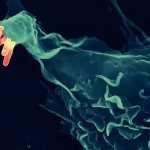Lien vers Pubmed [PMID] – 27092296
Front Cell Infect Microbiol 2016;6:35
Shigella is a Gram-negative bacterial pathogen, which causes bacillary dysentery in humans. A crucial step of Shigella infection is its invasion of epithelial cells. Using a type III secretion system, Shigella injects several bacterial effectors ultimately leading to bacterial internalization within a vacuole. Then, Shigella escapes rapidly from the vacuole, it replicates within the cytosol and spreads from cell-to-cell. The molecular mechanism of vacuolar rupture used by Shigella has been studied in some detail during the recent years and new paradigms are emerging about the underlying molecular events. For decades, bacterial effector proteins were portrayed as main actors inducing vacuolar rupture. This includes the effector/translocators IpaB and IpaC. More recently, this has been challenged and an implication of the host cell in the process of vacuolar rupture has been put forward. This includes the bacterial subversion of host trafficking regulators, such as the Rab GTPase Rab11. The involvement of the host in determining bacterial vacuolar integrity has also been found for other bacterial pathogens, particularly for Salmonella. Here, we will discuss our current view of host factor and pathogen effector implications during Shigella vacuolar rupture and the steps leading to it.

